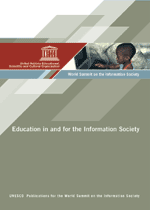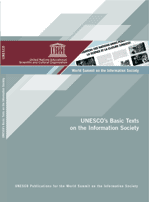 Download the entire document.
Download the entire document. (PDF file, 84 pages.)
Cynthia Guttman, UNESCO Publications for the World Summit on the Information Society, UNESCO, 2003.
This report was intended to bring to the attention of a broad audience the potential of ICTs to expand and improve teaching and learning in a wide variety of contexts. It has a specific focus on developing regions and UNESCO’s initiatives. The report seeks to draw attention to issues that have arisen in the context of globalisation, involving cultural diversity, ownership of knowledge and equity. Finally, it is underpinned by UNESCO’s core mission “to promote the free exchange of ideas and knowledge,” and the Organization’s renewed focus on upholding education as a fundamental human right, improving educational quality, encouraging innovation, enhancing capacities and acting as a catalyst for international co-operation.
The report begins by summarizing commitments of the world community of nations, such as Education for All and the Millennium Development Goals. It considers the implications of those commitments in the context of the discussions of the World Summit on the Information Society. The author notes that "The relationship between ICTs and education "is a complex one, confronting policymakers, educators and the international community with a new spectrum of ethical and legal issues."
The Chapters in this book are:
1. Introduction: Global Commitments
2. Towards Knowledge Societies
3. ICTs as Catalysts for Innovation
4. Principles of success
5. Conclusion: A Shared Vision

